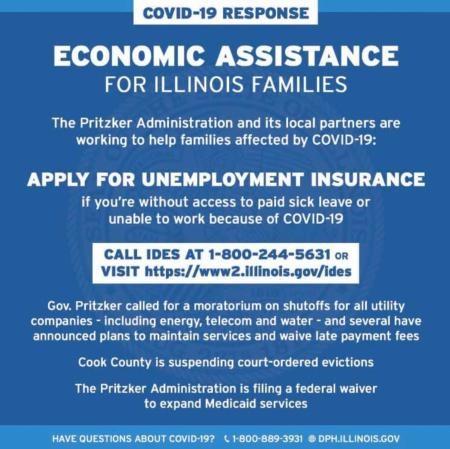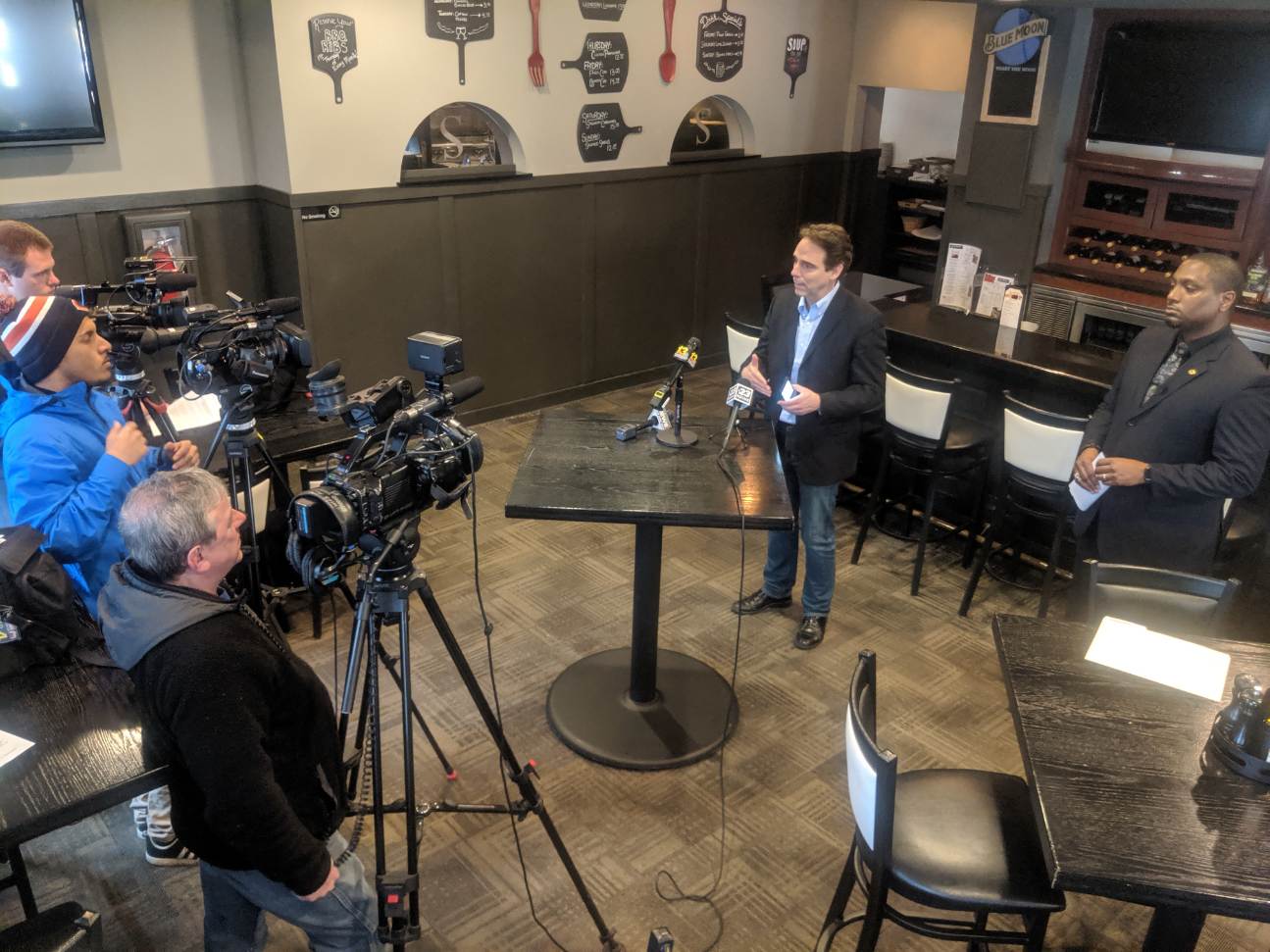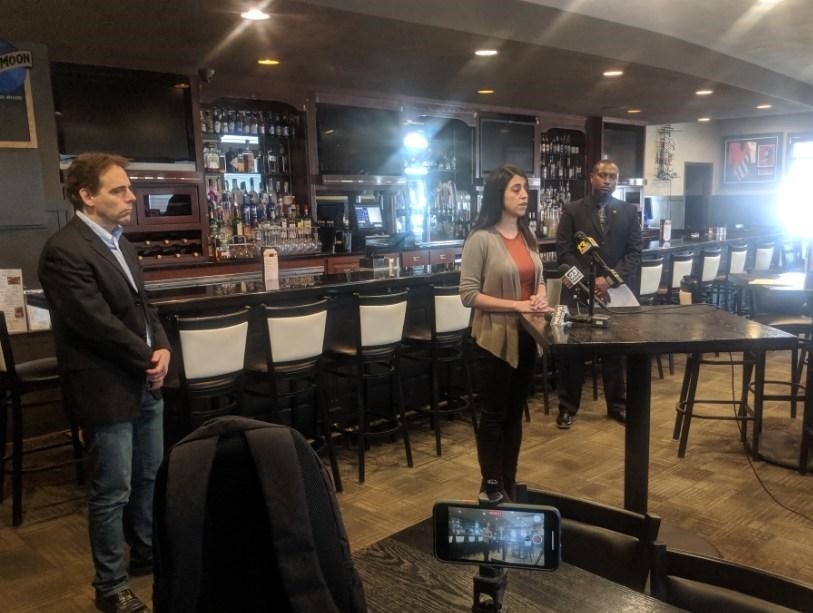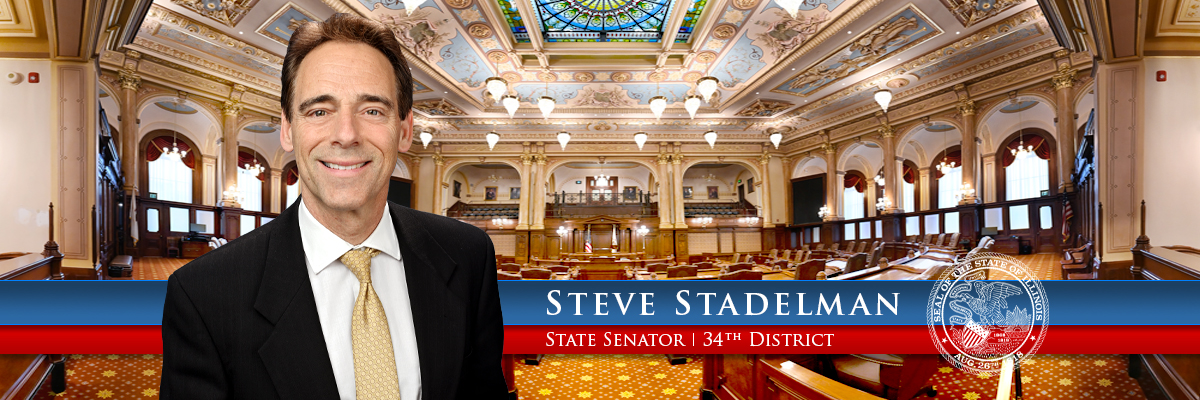- Details
- Category: Latest
Stadelman: Illinois needs to implement Work-Share law now
A law passed by State Senator Steve Stadelman could be put to work to ease the pain for businesses and employees during tough economic times caused by the COVID-19 pandemic. The law also would allow Illinois to collect millions of dollars in federal funding for states that have "work-share" programs.
The only thing standing in the way is a lack of rules needed to guide the law's implementation, rules that never were written by former Gov. Bruce Rauner’s administration.
Stadelman's legislation in 2014 changed how unemployment benefits are paid in Illinois, potentially reducing layoffs and improving state finances. It created work-share benefits, which are meant to assist struggling employers, allowing them to temporarily reduce employee hours rather than lay off workers.
At the same time, workers can collect partial unemployment compensation while staying on the job part time. Work-share also would help Illinois save money by not having to pay full benefits for employees drawing unemployment compensation.
"The value of work-share cannot be over-emphasized," Stadelman said. "In this uncertain time, employees who otherwise face layoffs would gain a sense of security, and businesses would avoid having to let skilled workers go."
Research from the Illinois Economic Policy Institute estimates work-share could prevent up to 124,000 in COVID-19 layoffs in Illinois and save the state over $1 billion dollars in unemployment insurance payments. According to the institute's Frank Manzo, the federal government will fully reimburse any state for its work share program.
“Under the $2 trillion coronavirus relief package, the federal government is, with some stipulation, fully reimbursing states for their work-share programs,” Manzo said in an April 7 article. “It is free money for the states that currently have these programs.”
Similar laws are in place in 29 other states. Under the Illinois law, partial benefits would be paid when a business cuts hours for at least 10 percent of its staff and shares the remaining work among affected employees.
“Businesses get to keep already-trained employees on staff, and employees get to keep their jobs while collecting partial benefits until they return to work full time,” Stadelman said.
At a Thursday news conference, Gov. JB Pritzker said he supports the work-share program. Stadelman is now urging the Pritzker administration to write the rules needed for work-share to go into full effect.
State contributes $250,000 to United Way's local relief fund
State Senator Steve Stadelman helped direct $250,000 from the Illinois' COVID-19 Response Fund to the United Way of Rock River Valley to support local nonprofit groups assisting individuals and families adversely affected by the pandemic.
"We were honored to be chosen" from only 30 organizations statewide that are providing COVID-19 relief at the local level, United Way staff said in a newsletter this week. "Using the ICRF's gift ... we made our first round of grant allocations to local non-profit organizations that are best suited to meet our region's greatest needs."
United Way, which established its Emerging Needs Fund with an anonymous $10,000 donation, announced in its newsletter that almost $550,00 has been raised so far. A list of first-round grant recipients can be found here.
Feeling overcome by the many sources of stress in your life right now?
If your level of worry seems abnormally high, the Illinois Department of Human Services has a free emotional support text line. Reach out for help. Text “TALK” to 5-5-2-0-2-0.
- Details
- Category: Latest
State releases new guidelines for claiming unemployment benefits
People filing claims for unemployment benefits in Illinois are being asked to adhere to an alphabetized schedule because of overwhelming phone and internet traffic.
The state's Department of Employment Security is also issuing a reminder that the day or time of day in which a claim is filed will not affect whether claims are approved or benefit amounts.
Additionally, claims will be back-dated to reflect the date in which claimants were laid-off or let go from their jobs due to COVID-19. More information is available at the IDES website.

Stadelman, West highlight emergency grants and loans for small businesses
State Senator Steve Stadelman and State Rep. Maurice West today detailed three new emergency assistance programs geared toward providing immediate economic assistance to small businesses in communities across Winnebago County that have been negatively impacted by the COVID-19 pandemic.
“The economy in this community is driven by small businesses, and small businesses are often owned and run by a single individual or family," Stadelman said during a media opportunity at Salamone's restaurant in downtown Cherry Valley. "As we continue to see corporate investment at the federal level, it’s refreshing to see the state of Illinois prioritizing these businesses and recognizing that their needs are significantly different than the needs of massive corporations during this uncertain time.”
Added West, "We're moving in uncharted territories at this time, and it's important for the government to provide support as much as possible. I want to make sure all of our businesses in the Rockford region apply for the programs they are eligible for."
Stadelman and West were joined restaurant owner Rosalie Salamone, who shared the impact of the global health crisis on her family's business.


Hospitality Emergency Grant Program
To help hospitality businesses make ends meet in the midst of the COVID-19 pandemic, the Illinois Department of Commerce and Economic Opportunity is launching the Hospitality Emergency Grant Program. Bars, restaurants and hotels can access $14 million in grants to support working capital (rent, payroll and other accounts payable), job training (such as new practices related to take out, delivery and sanitation) and technology enabling new operations.
Bars and restaurants that generated between $500,000 and $1 million in revenue in 2019 are eligible for up to $25,000, and bars and restaurants that generated less than $500,000 in revenue in 2019 are eligible for up to $10,000. Hotels that generated less than $8 million in revenue in 2019 are eligible for up to $50,000. Funding for the new program comes from money originally budgeted for tourism promotion, job training and other purposes.
Application deadline is 5 p.m. April 1.
Downstate Small Business Stabilization Program
To support small businesses in downstate and rural counties across Illinois, DCEO is repurposing $20 million in federal funds to establish the Downstate Small Business Stabilization Program. This Fund will offer small businesses of up to 50 employees the opportunity to partner with their local governments to obtain grants of up to $25,000 in working capital. These grants will be offered on a rolling basis.
Application period opens March 27.
Illinois Small Business Emergency Loan Fund
The $60 million program will support low-interest loans of up to $50,000 for small businesses in every industry outside of Chicago. Businesses with fewer than 50 employees and less than $3 million in revenue in 2019 will be eligible to apply. Successful applicants will owe nothing for six months and then begin making fixed payments at 3-percent interest for the remainder of a five-year loan term.
Application period opens March 27.
To submit applications or obtain additional information on the three programs, visit the DCEO website.
- Details
- Category: Latest

Dear Chamber Leaders,
This is a time of great change and uncertainty. I appreciate your patience and your willingness to assist
as our community navigates the COVID-19 outbreak.
I'm sure you are receiving as many calls looking for guidance as my office. To help you respond to questions from businesses, I have compiled a list of services that may assist you. For your reference, I have attached:
a FAQ to help restaurant and bar employees navigate the unemployment insurance program
guidance from the federal Department of Health and Human Services regarding infection
control and prevention in nursing homes, and
a copy of the executive order prohibiting on-premises food and drink consumption at all Illinois
establishments.
Gov. JB Pritzker announced today that Illinois will extend its income tax filing deadline from April 15 to July 15 to coincide with the federal extension. In addition:
In addition, Illinois has secured a statewide Economic Injury Declaration with the U.S. Small Business Administration. As a result, small businesses that have been affected by the COVID-19 outbreak now have access to up to $2 million in low-interest disaster assistance loans. Interested business owners can apply at sba.gov/disaster.
The Illinois Department of Financial and Professional Regulation has extended license expiration dates and continuing education deadlines. Licensees may complete continuing education requirements and other coursework online.
To help alleviate some of the economic challenges facing bars and restaurants due to COVID-19, the Department of Revenue will defer sales tax payments for more than 24,000 small- and medium-sized bars and restaurants. More information on the deferral is available at tax.illinois.gov.
These changes have been made possible by emergency declarations at both the state and federal levels. Gov. Pritzker has signed a series of executive orders granting the authority for these changes in an
effort to contain the spread of COVID-19 in the state.
Please understand these policies are fluid and subject to change. Additionally, more changes might be forthcoming.
Feel free to share with your business community. They, too, may have some recommendations on how we might offer help to our local business owners during this challenging time, and I would encourage you to forward these suggestions to me for consideration. If you would like more information on any policy or topic, please let me know.
My office remains open by phone (815-987-7557) or email (
Sincerely,
State Senator Steve Stadelman
34th District
- Details
- Category: Latest

Coronavirus: What you should know

Stadelman moves to protect survivors of sexual assault
State Senator Steve Stadelman has introduced a bill that would make a civil no-contact order permanent if an individual is criminally convicted of sexual assault. Under current law, sexual assault survivors must see their alleged assailants in court every two years to renew their no contact orders.
“Survivors of sexual assault have to live day in and day out with the trauma caused by assault,” Stadelman said. “The least we can do to help them is not to force them to relive their trauma every 2 years.”
Stadelman developed the Senate Bill 3617 in consultation with the City of Rockford and Rockford Sexual Assault Counsel (RSAC). Similar lifetime protection orders are already in place for stalking victims.
“If an individual believes that it’s in the best interest of their safety to extend an order of no contact against their criminally convicted perpetrator, they should have the right to do so,” Stadelman said. “People should have the right to feel safe in their daily lives without having to endlessly go to court.”
Stadelman fights for rights of kids to run lemonade stands
State Senator Steve Stadelman voted last week for legislation that would prevent children from having their lemonade stands shut down by overzealous local bureaucrats. The legislation was inspired by the story of 11-year-old Hayli Martinez, who last week told the Senate Public Health Committee about how officials in Kankakee flagged and quickly closed her lemonade operation last summer.
“My lemonade stand is a dream I shared with my grandma before she passed away -- she always told me to make lemonade out of lemons, so I did,” Martinez said. “When my lemonade stand was shut down, I became very upset. I asked myself, "Why me?" I didn’t do anything wrong.”
Stadelman is the sponsor of Senate Bill 3169 and co-sponsor of Senate Bill 3459. Both would eliminate local requirements such as a license, permit or fee to sell lemonade for an individual under the age of 16.
“We should be encouraging our young entrepreneurs. The current law does nothing but discourage them,” Stadelman said. “I remember what it was like to be a kid in the summer, trying to find something to do. This legislation allows our youth to be creative and make a small profit at the same time.”
SB 3459 passed committee and will now be reported to the Senate floor for full consideration.
Stadelman legislation to spur construction spending passes Senate
Legislation introduced by State Senator Steve Stadelman to help the state finance construction projects across Illinois passed the Senate last week.
Stadelman's bill allows the Illinois Treasurer to invest up to 5 percent of the state’s investment portfolio in Illinois infrastructure development companies, a change that would permit up to $700 million in financing.
“This measure creates new economic development opportunities for the state,” Stadelman said. “The construction industry is a key part of our state’s economy, so it only makes sense to allow the treasurer to invest in infrastructure projects.”

In case you missed me on Facebook ...
Congratulations to recipients of the YWCA achievement awards at the 40th Leader Luncheon today and thank you to Calvin Wesley for his kind letter supporting my nomination in the racial justice category. In his letter, Calvin expressed hope for his personal growth, having obtained free legal assistance to expunge an old criminal record through the Second Chances Summit, a partnership between my office and Prairie State Legal Services.

Rockford area members of the Illinois Clean Jobs Coalition came to the Capitol to advocate for more state investment in wind and solar energy.

More Articles …
Page 4 of 12




